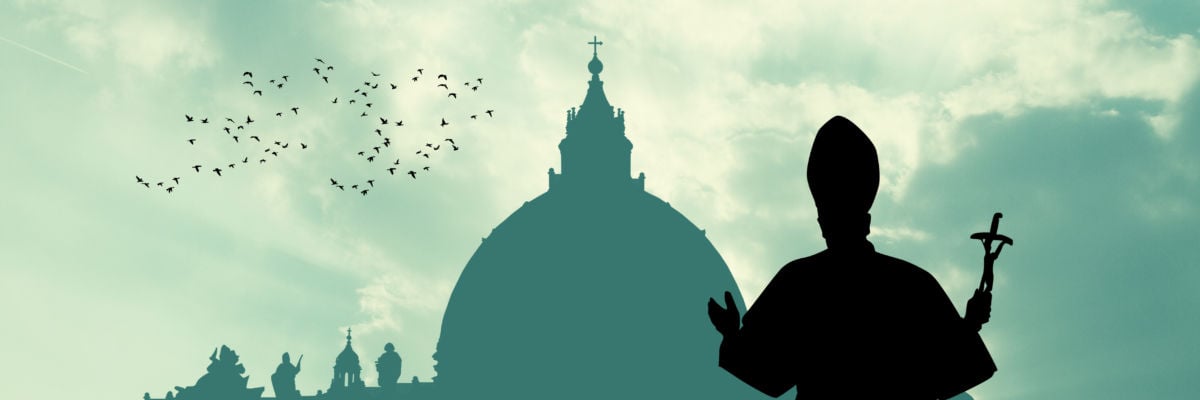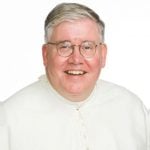
Homily for the Twenty-Fourth Sunday in Ordinary Time, 2021
Jesus and his disciples set out
for the villages of Caesarea Philippi.
Along the way he asked his disciples,
“Who do people say that I am?”
They said in reply,
“John the Baptist, others Elijah,
still others one of the prophets.”
And he asked them,
“But who do you say that I am?”
Peter said to him in reply,
“You are the Christ.”
Then he warned them not to tell anyone about him.He began to teach them
that the Son of Man must suffer greatly
and be rejected by the elders, the chief priests, and the scribes,
and be killed, and rise after three days.
He spoke this openly.
Then Peter took him aside and began to rebuke him.
At this he turned around and, looking at his disciples,
rebuked Peter and said, “Get behind me, Satan.
You are thinking not as God does, but as human beings do.”He summoned the crowd with his disciples and said to them,
“Whoever wishes to come after me must deny himself,
take up his cross, and follow me.
For whoever wishes to save his life will lose it,
but whoever loses his life for my sake
and that of the gospel will save it.”-Mark 8:27-35
This is the year of St. Mark (bureaucratically called “Year B” by the poetically inclined liturgists), in which on most Sundays we hear a passage from his Gospel. Mark’s Gospel has a number of notable qualities that distinguish it from the other three. The one I like most is the constant use of the adverb suddenly. The meaning of that, however, is for another homily on another Sunday.
The most obvious notable quality of Mark’s Gospel is that it is the shortest of all; and indeed, according to the traditional opinion it is an abbreviation of St. Matthew’s Gospel, directed by St. Peter.
Today’s lesson is a practically exact parallel of the same scene in Matthew 16, with only one significant portion omitted at Peter’s direction. It is the verses in which the Savior tells Peter, “Thou art Peter, and upon this rock I will build my church: and the gates of hell shall not prevail against it. And I will give unto thee the keys of the kingdom of heaven; and whatsoever thou shalt bind on earth shall be bound in heaven, and whatsoever thou shalt loose on earth shall be loosed in heaven.”
Now why would Peter, even for the purposes of abbreviation, leave all this out entirely? He could have just directed Mark to write a shorter version giving his, that is, Simon’s new name of Peter.
When we look carefully at the abbreviated things in Mark’s Gospel, we often find that the abbreviation is not just for the sake of shortening, but is intended to bring out more precisely the deepest essence of the scene. What is that essence in this reading from Mark?
Undoubtedly it is the fact, which here he tells the disciples for the first time, that he is to suffer and die and rise again on the third day: the event of the mysteries of our redemption. This is a deeper reality even than another that he immediately reveals as well: that each of his disciples must be conformed to that mystery of suffering, death, and rising, taking up his cross, and following Christ by losing his own life for Christ’s sake.
The keys of the kingdom of heaven are bestowed in giving the highest rank, office, and authority under heaven—that of Peter and his successors. This is included in Matthew’s account. Mark’s leaves this out perhaps to emphasize more the commission that belongs to every Christian from the least to the greatest, from the simplest catechumen to the pope of Rome, and to all equally. All, each and every disciple, must carry the cross after Jesus. Without the willingness to do this, we do not share in the salvation accomplished by him, no matter what our rank or office.
There is only one pope; there can never be two heads of the Church on earth. But there are and have been hundreds of millions of crucified followers of the Crucified. That is the universal vocation.
Pope Emeritus Benedict XVI has given us the example in this. In a speech given by his secretary who works very closely with him, we read that Benedict views himself as continuing in his Petrine ministry not as the one juridical pope, but through suffering and contemplation as pope emeritus, in support of the Church. In this, he gives an example of which Peter in this abbreviated passage would approve, for Peter himself crowned his greatest office of being the vicar of Christ not with a tiara but with the cross, on which he died in fulfillment not only of his power of binding and loosing, but of bearing and suffering with Christ for his Church.
We do not read that Peter objected to being the rock on which the Church is founded, but he did object to the Savior’s embrace of suffering for the sake of the kingdom! But he made good on his initial and repeated reluctance, and ended gloriously following in the footsteps of his crucified Lord.
We are not all little popes, deciding what the Church is supposed to be like, even if some people think or act that way, but each of us shares the same vocation as the pope, and he has the same as we do: the vocation of the cross, which leads to resurrection, and this is the deepest, most lasting, and powerful source of the Church’s life. Its fruits will last long after the See of Peter is only an earthly memory in the kingdom of heaven.



